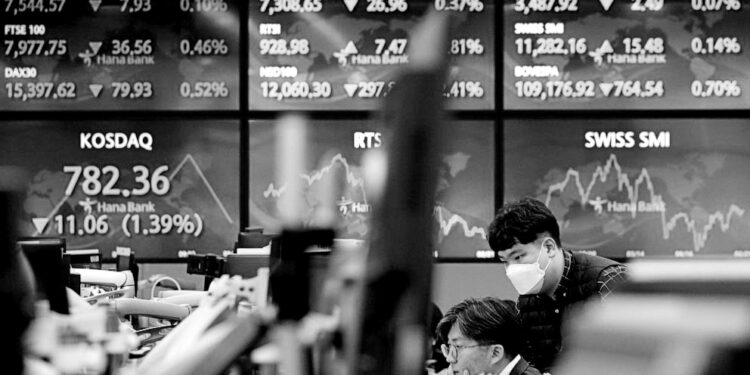Asian shares have fallen after stocks tumbled on Wall Street as worries persist about higher interest rates and their tightening squeeze on the global economy
Asian shares declined Wednesday after stocks tumbled on Wall Street as worries persist about higher interest rates and their tightening squeeze on the global economy.
Tokyo’s benchmark Nikkei 225 dipped 1.4% in afternoon trading to 27,102.21. Australia’s S&P/ASX 200 slipped 0.3% to 7,314.50. South Korea’s Kospi dropped 1.6% to 2,419.15. Hong Kong’s Hang Seng slipped 0.3% to 20,461.32, while the Shanghai Composite shed 0.6% to 3,287.64.
New Zealand’s central bank raised its benchmark interest rate by a half-point to 4.75% to try to wrestle down inflation. The increase, which can raise the borrowing costs for consumers on everything from credit cards to mortgages, comes despite widespread economic pain from a devastating cyclone.
Higher rates hurt investment prices and raise the risk of a recession by slowing business investment and consumer spending.
U.S. employment and consumer spending have weathered higher interest rates well, but a report Tuesday showed sales of previously occupied homes slowed to their slowest pace in more than a decade. The mixed signals leave investors wondering if the Fed will ease back on rate hikes or resume a more aggressive stance.
“Amid the evolving new narrative of stronger US growth, payrolls, retail sales, and the additional Fed response required to tame the rude health of the US economy, investors are beginning to think the hawkish Fed may not have entirely run its course yet,” Stephen Innes of SPI Asset Management said in a commentary.
The S&P 500 fell 2% to 3,997.34 on Tuesday for its sharpest drop since the market was selling off in December. The Dow Jones Industrial Average lost 697 points, or 2.1%, to 33,129.59 while the Nasdaq composite sank 2.5% to 11,492.30.
Home Depot fell to one of the market’s larger losses after giving financial forecasts that fell short of Wall Street’s expectations. It dropped 7.1% despite reporting stronger profit for the last three months of 2022 than expected.
The retailer said it would spend $1 billion to increase wages for hourly U.S. and Canadian workers. That fed into broader worries for markets that rising costs for companies have been eating into profits, which are one of the main levers that set stock prices.
Rates and stock prices are high enough that strategists at Morgan Stanley say U.S. stocks look to be more expensive than at any time since 2007.
The yield on the 10-year Treasury, which helps set rates for mortgages and other important loans, leaped further to 3.95% from 3.82% late Friday. The two-year yield, which moves more on expectations for the Fed, rose to 4.72% from 4.62%. It’s close to its highest level since 2007.
Yields have shot higher this month as Wall Street ups its forecasts for how high the Federal Reserve will take short-term interest rates in its efforts to stamp out inflation. The Fed has already pulled its key overnight rate up to a range of 4.50% to 4.75%, up from basically zero at the start of last year.
The worry is that the Fed could ratchet up its forecasts for rates further next month when it releases its latest projections for the economy. Besides showing more strength in the job market and retail sales than expected, recent reports have also suggested inflation is not cooling as quickly and as smoothly as hoped. Investors are also pushing back their forecasts for when the first cut to rates could happen.
Those worries have caused the strong rally by Wall Street early in the year to stall. Having risen as much as 8.9%, the S&P 500 is now clinging to a gain of 4.1% for the year so far.
In other trading Wednesday, benchmark U.S. crude lost 35 cents to $76.01 a barrel in electronic trading on the New York Mercantile Exchange. Brent crude, the international pricing standard, fell 37 cents to $82.68 a barrel.
The U.S. dollar fell to 134.85 Japanese yen from 134.92 yen. The euro rose to $1.0659 from $1.0653.
Source: abcNEWS



Recent Comments